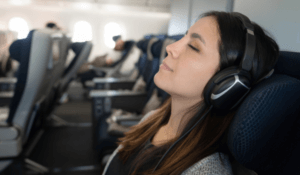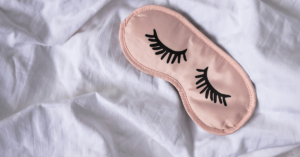 Summer’s calling, and the world beckons! Many of us are dusting off our suitcases and planning exciting adventures for the season. Along with all the excitement of seeing new places and visiting friends and family, the reality of getting a good night’s sleep while traveling can present a real challenge.
Summer’s calling, and the world beckons! Many of us are dusting off our suitcases and planning exciting adventures for the season. Along with all the excitement of seeing new places and visiting friends and family, the reality of getting a good night’s sleep while traveling can present a real challenge.
Whether you’re jet-setting around the globe or heading out for a road trip adventure, different beds and new routines can wreak havoc on your sleep patterns. Fear not; here are some tips for getting plenty of good zzz’s wherever you find yourself.
Before getting into ways to help you sleep longer and better while traveling, think for a moment about what might be causing sleep issues and problems. Here are some big-picture areas to consider:
First night effect
The familiar “first-night effect” isn’t just a traveler’s worry. Sleeping in unfamiliar environments can mess with your brain’s sense of serenity. Trading the familiar comforts of home for new surroundings might give your adventurous spirit a thrill, but it can send your sleep routine into a dive. After all, at home, you’ve got everything you need; think: your favorite pillow, and your preferred thickness of blanket. It’s all so comforting and helps you wind down and slip into dreamland with ease.
Here’s a fact we found in our research – our brains are wired to stay partially awake when we’re in a new place, like a night watchman, always on the lookout for any potential threats. Comes a random noise or an unexpected flash of light, and suddenly you’re wide awake, wrestling with a bout of insomnia. So, when you’re in a new place, it’s not uncommon for the first-night effect to spoil your snooze.
Travel stress
A vacation is meant to be a time to recharge and rejuvenate. But before the fun, there’s planning, packing, making sure everything’s shipshape back home, and then the actual getting-there part. Just thinking about getting it all done, and worrying on the way to the airport if you’ve left anything out, can feel like running a marathon, and even though the mind may log it as positive stress, the body just processes stress as stress.
All this significant physical and mental stress leads to what’s popularly termed ‘travel fatigue.’ You might think it’s the miles under your belt causing that exhaustion, but the fact is, even the shortest jaunts can leave a traveler feeling wiped out.
So when you finally reach your dream destination, instead of hitting the town, don’t be surprised if you find yourself more interested in hitting the sack. That’s normal, and tuning into your body’s cues can help you stay on top of your sleep hygiene.
Jet lag 
Jet lag is an unwanted companion for travelers journeying across time zones. It kicks in when your body’s internal clock goes out of sync with the day-night cycle of the new locale.
Imagine your body as being a well-rehearsed orchestra, keeping perfect time to the 24-hour symphony of day and night, with light cues setting the pace. Now, picture the conductor, which in this case is the brain’s pituitary gland, signaling with a hormone called melatonin, that gracefully commands your body to get its needed shut-eye. But there’s a plot twist: you’ve hopped a few time zones, and the lighting in the orchestra pit and the concert hall are at odds. The concert starts according to the schedule set by your internal clock, but the audience has come in to hear the show either too early or too late. Welcome to the quirky world of jet lag.
Before you say, “but once before, when I traveled for hours from New York to Lima, I didn’t feel jet lagged,” remember, it’s all about the time zones, not airtime. Eastward travel can turn night owls into early birds, leaving you wide-eyed in the wee hours. On the flip side, a westward journey can have you craving a nap in the middle of the day because your body is convinced it’s past bedtime. Either way, your sleep’s thrown out of whack.
And, as if being a walking, yawning mess isn’t bad enough, jet lag is notorious for other party tricks, like tummy troubles, brain fog, and a general drop in your usual capabilities.
Food
Traveling often leads to indulging in physical pleasures a bit more than usual, be it in the form of alcohol, food, or both. You may find yourself splashing out on an extra glass of wine or feasting on decadent dinners that you wouldn’t ordinarily have at home. As joyful as these indulgences can feel in the moment, there is always the risk that it might boomerang back on you when it’s time to turn in for the night, nudging your usual sleep routines even further off the tracks.
And don’t forget that the gastronomic joy of tucking into exotic and unfamiliar cuisine can end up with your tummy objecting to some of the local microbes that tagged along with those mouth-watering new dishes. A resultant discomfort, like diarrhea, can hit your sleep schedule out of the park. So what can you do to help yourself?
Our five tips for getting a good night’s sleep while on vacation
Prepare your body, mind, wallet, and meds for the trip.
Avoiding travel fatigue isn’t entirely possible, but a bit of forward planning can bring the levels of stress and disruption to a minimum. Here are a few tips:
- Create a task list, charting all of the necessary steps that you need, so you can arrive at the departure gates in good time and good mood.
- There are few things worse than arriving at a foreign destination and needing some of your daily meds, or encountering some new environment that puts you flat out in bed, with ne’er a doctor, pharmacist (or one that speaks your language) in sight. Remember that while COVID may have been contained here in the US, it is still running around elsewhere. Protection is better than cure, so carrying an effective shield like Enovid can make all the difference between a happy holiday and a nightmare. So don’t leave home without it!
- Do your best to get a few nights of good sleep before you head out so that you begin your trip well-rested.
- Set up a bedtime routine that works for you at home, such as having a warm bath or shower, performing relaxing activities or deep breathing exercises, doing some light reading or listening to relaxing music. This can help the body know when it’s time to rest, even if the circadian rhythm thinks otherwise. Try to continue this routine on your vacation.
Create a sleep-friendly room.
Making the room you’re trying to sleep in look, feel and smell familiar will help your brain to rest better because it reminds you of home. This helps reduce the first-night effect of sleeping for the first time in an unfamiliar place. Simple steps like keeping it quiet and dark and having some of your favorite sleep accessories with you are great ways to help ease your body into getting a good night’s sleep. If there is a high level of noise or light, spending a few dollars on an eye mask, earplugs, or a white noise device could be well worth it.
Help your body get rid of jet lag faster.
As we mentioned above, making sure you get a few nights of solid snooze before you leave can be really helpful with jetlag. Another tip is to get your body’s internal body clock aligned to the new time zone before you head out. Making a slight adjustment to your sleep pattern to match the new timezone before you leave, can help you slip more easily into the routine when you get there.
Once you’re in the new locale, you can use your body’s built-in reaction to sunlight to speed up the internal clock, just by walking around or sitting outside in the sunshine.
Wake your body up with some exercise.
First thing each morning, once you have arrived, do some physical activity or exercise. It helps signal that your body now needs to be active, and your brain must be awake and alert.
Physical activity itself is an excellent way to improve your sleep pattern. As well it can reduce stress levels and improve your mood.
Use melatonin to help your brain fall asleep.
Your pineal gland naturally produces melatonin as evening falls, which triggers sleepiness, and the output steadily increases to keep you asleep until it tapers off towards morning. If your body is short of melatonin, it can disrupt sleep. You could use a melatonin supplement, like Circadin, to help your body relax and getting a good night’s sleep while jet-lagged.
We hope this helps! Enjoy.

















